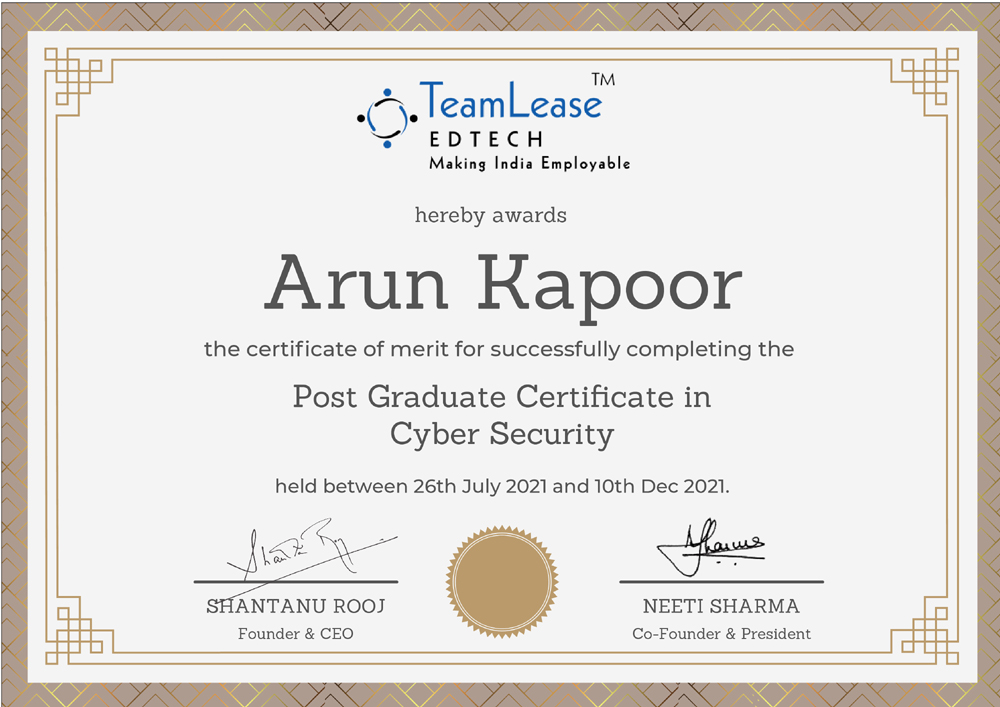Cyber Security is one of the most in-demand skills trending in the job market today. India is likely to spend almost $3 Billion in 2022 alone on fighting the Cyber Security threats. Some of the most significant data breaches in India in this year itself included Dominos’ 180 Million order details, Air India’s 4.5 million passenger details, Mobikwik’s 110 million user details to name a few.
Needless to say, there is a massive requirement for Cyber Security professionals in India and the rest of the world. And this demand is growing each day. Our 5.5-months Certificate Program in Cyber Security will help prepare you for the jobs of the future. As part of this job guaranteed* certificate course, you will receive a provisional offer letter at the beginning of the program upon clearing the pre-assessment process. Once you finish the course and fulfill the minimum requirement of the final assessment and all course requirements, you will be provided placement in companies.*T&C Apply
 Who Should Attend?
Who Should Attend?
- Fresh Engineering Graduates,
BCA & MCA Students
 Course Duration
Course Duration
225 Hours (5.5 months)
 Course Fee
Course Fee
80,000 + GST
 Eligibility
Eligibility
Graduation with at least 50% marks
 Pedagogy
Pedagogy
Virtual instructor-led training (VILT)
 Certified / Accredited By
Certified / Accredited By
TeamLease EdTech
 Build expertise in Cyber Security and Cyber Defense
Build expertise in Cyber Security and Cyber Defense
 Define security concepts, technologies and tools that support secure application development
Define security concepts, technologies and tools that support secure application development
 Recognize security flaws and use alternative solutions to solve Cybersecurity problems
Recognize security flaws and use alternative solutions to solve Cybersecurity problems
 Examine the security infrastructure and validate security architecture
Examine the security infrastructure and validate security architecture
 Demonstrate their analytical skills for cryptography, security policies and information exchange protocols in secured communication
Demonstrate their analytical skills for cryptography, security policies and information exchange protocols in secured communication
 Propose security best practices for Cybersecurity with modern tools, offensive security frameworks, metasploit, develop exploits and penetration distro
Propose security best practices for Cybersecurity with modern tools, offensive security frameworks, metasploit, develop exploits and penetration distro
- Fundamentals of Programming Language with Data Structures (Java)
- Networking Essentials
- Linux Administration
- Python Programming
- Fundamentals of Cyber Security
- Information Security Architecture and Applied Cryptography
- Network and Communications Security Web
- Application Security
- Intrusion Detection and Prevention System
- Ethical Hacking and VAPT
- Cyber Laws and Regulations
- Capstone Project
CERTIFICATE PROGRAM
IN
CYBER SECURITY
Complete the program successfully to obtain this valuable certificate.

Kind of Jobs Available After the Course
Cyber Security is one of the most in-demand skills, trending in the job market today. Studies point out that there will be nearly 3.5 million unfilled cybersecurity jobs globally by 2022. The National Association of Software and Services Companies (NASSCOM) estimated that India will need 1 million cybersecurity professionals by 2022. India alone has reported over 67,000 job openings.
Popular Job Roles in India in Offensive Cyber Security:
- Network Security Engineer
- Cyber Security Analyst
- Security Architect
- Cyber Security Manager
- Cyber Security Consultant
- Chief Information Security Officer (CISO)
Course Curriculum
Praparatory Bridge Course (20 Hours of Online Instructor led Sessions)
| Introduction History and Importance of Computer Networking |
| Computer Networking OSI reference model & its layers |
| TCP/IP Suite and its applications |
| Computer network topologies and types |
| IP address- ver (IP v4.0 & IP V6.0), Classes & Subnetting |
| Firewalls, IDS & IPS |
| Troubleshooting |
| Introduction to OS |
| Windows & Linux Fundamentals |
| Users, Group & Permission |
| Creating & Editing Text Files |
| Memory Partitioning |
| SE Linux |
| FTP, DHCP Client Server Configurations |
| Linux Boot Process |
| Network Communication with Firewall |
| Fundamentals of Programming and basic building blocks |
| Objects & Classes |
| Overview of Advanced Algorithm Design and Analysis |
| Introduction of C, C++, Python Programming |
After the completion of Preparatory Bridge Course, participants will take an online assessment that assesses their understanding of the Bridge Course
| Introduction to Cyber Security |
| Cyber Security Concepts and Security in evolving Technologies |
| Information and Network Security |
| Type of Cyber Attacks |
| Cyber Laws and Forensics |
| Introduction to Security Architecture & Engineering |
| OS Fundamentals and Security |
| Cryptography and Encryption |
| Cryptographic key Management, Message Digests and Digital Signatures |
| Identity Access Management |
| Understanding of Security Operations |
| Incident Response Process |
| Logging, Monitoring and Auditing |
| Principles and Components of Network Security and Spoofing |
| Types of Attacks |
| Fundamentals of Connections, Requests, Ports and Packets with Wireshark |
| Packet Inspection and attack against availability |
| Design and Configure Firewalls |
| Network Access Control |
| Define and Configure IDS |
| IPSec Tunnelling and its importance |
| SIEM tools and additional Security measures |
| Overview of Web Application |
| Web Applications Security Fundamentals |
| Web Application and associated Vulnerabilities |
| Cookies and Tracking |
| Data and Database Security |
| Injection Flaws |
| Phishing and other attacks on Identity |
| Client-side and Server-side Security |
| Cloud Application Security |
| Regulation, Compliance and Risk Management |
| Lab Exercise |
Mid Term Assessment (Combination of MCQ-based and practical’s) to test the concepts learnt so far
| History of Intrusion detection, Audit |
| Intrusion Prevention Systems |
| Introduction to Snort, Snort Modes |
| Working with Snort Rules |
| Using ACID and Snort Snarf |
| Introduction to Honeypots |
| Ethical Hacking |
| Footprinting |
| ARP Poisoning, Spoofing |
| Vulnerability Assessment |
| Penetration Testing |
| Lab Exercise |
| IT Act- Evolution and Salient Features |
| Cyber Space Jurisdiction |
| E-Commerce and Laws in India |
| Intellectual Property Rights |
| Sensitive Personal Data or Information (SPDI) in Cyber Law |
| Case Studies on Cyber Laws in India |
| Case Study and its architecture |
| Introduction to various Int'l Cyber Security Certifications |
| Demonstrate your knowledge and skills by working on capstone projects using Cuckoo Sandbox tool for malware analysis, Homomorphic Encryption methods and network intrusion Detection systems |
| (Project Briefing and Doubt Clearing Session) |
Final Assessment (MCQ-based and Practical’s) including the Project Viva-voice. Upon successful completion, students shall be awarded the certificate
Corporate essentials & interview preparatory course
Complementary 10 hours of online instructor-led sessions
| Introduction & Importance of Analysis |
| Understanding Analytical Thought, Skill and Ability |
| The Analytical Process |
| Analytical Tools |
| In Person Communication |
| Business Etiquette |
| Written Communication |
| Introduction to the World of E-Mails |
| Writing and Managing E-Mails |
| E-mail Etiquette |
| E-mail Policy and Legal Musts |
| Understand a GD and its purpose |
| Understand different types of GD and what a panel looks for |
| Understand the preparation required to participate effectively in a GD |
| Understand the correct way of presenting yourself during a GD |
| Understand how to have an effective closure to the discussion in a GD |
| Defining Interviews and their Purpose |
| How to leverage oneself during an Interview |
| Understand the concept of Body Languages and its dos and don'ts |
| Learning Self-reflection and Interviewer's signals, STAR technique and Mock Interviews |
Assessment
Initial Assessment (only for applicants from Non-IT background)
Applicants from Non-IT background (graduates other than BE/BTech, MTech, BCA, MCA, BSc-IT, MSc-IT) will take an Initial assessment comprising of the following:
| Initial Assessment | Duration | Cut-Off |
| Aptitude Test (Logical Reasoning – 10 Questions, Quantitative – 10 Questions, Reading Comprehension – 10 Questions) | 45 Minutes | 60% and above |
Final Evaluation
Final Evaluation will comprise of the following components and weightages:
- Final Assessment – (Multiple Choice Questions) (30%)
- Project Viva-Voce (30%)
- Final Interview with the Organization Panel (40%)
Upon clearing a cut-off of 75% in total, the student will be offered the job by the potential organization.




